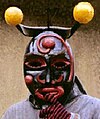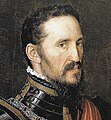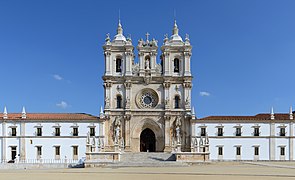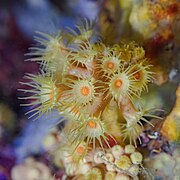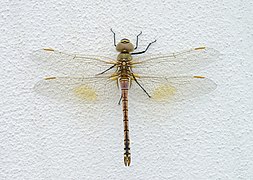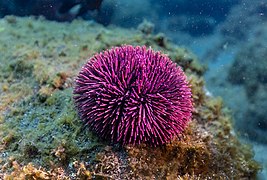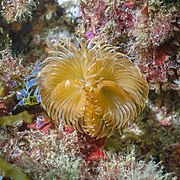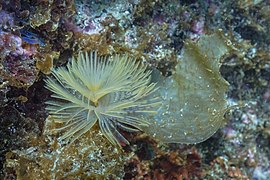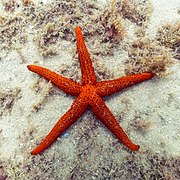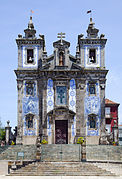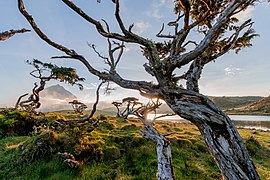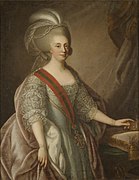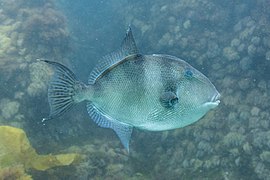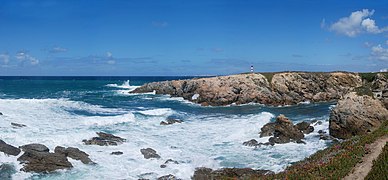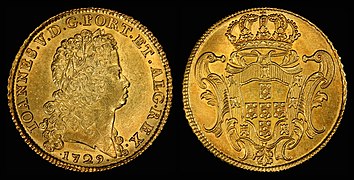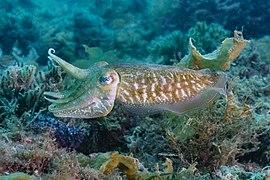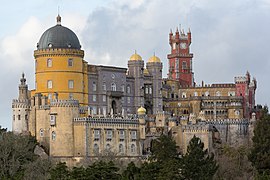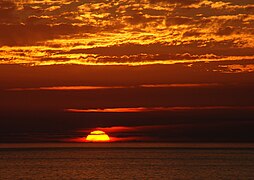Welcome to the Portugal portal
Lisbon , the capital of Portugal, overlooking the Tagus riverFlag of Portugal Location of Portugal in Europe Portugal Portuguese Republic , is a country located on the Iberian Peninsula , in Southwestern Europe , and whose territory also includes the Macaronesian archipelagos of the Azores and Madeira . It features the westernmost point in continental Europe , its mainland west and south border with the North Atlantic Ocean and in the north and east, the Portugal-Spain border constitutes the longest uninterrupted border-line in the European Union . Its archipelagos form two autonomous regions with their own regional governments . In the mainland, Alentejo region occupies the biggest area but is one of the regions in Europe with a lower population density. Lisbon is the capital and largest city by population, being also the main spot for tourists alongside Porto and Algarve .
One of the oldest countries in Europe, its territory has been continuously settled and fought over since prehistoric times . The territory was inhabited by the Celtic and Iberian peoples, such as the Lusitanians , the Gallaecians , the Celtici , Turduli , and the Conii . These peoples had some commercial and cultural contact with Phoenicians , ancient Greeks and Carthaginians . It was later ruled by the Romans , followed by the invasions of Germanic peoples together with the Alans , and later the Moors , who were eventually expelled during the Reconquista . Founded first as a county within the Kingdom of León in 868, the country officially gained independence as the Kingdom of Portugal with the Treaty of Zamora in 1143.
During the 15th and 16th centuries Portugal led the Age of Discovery and established one of the longest-lived maritime and commercial empires , becoming one of the main economic and political powers of the time. By the early 19th century, events such as the 1755 Lisbon earthquake , the country's occupation during the Napoleonic Wars , and the resulting independence of Brazil in 1822 led to a marked decay of Portugal's prior opulence . This was followed by the civil war between liberal constitutionalists and conservative absolutists over royal succession from 1828 to 1834. The 1910 revolution deposed Portugal's monarchy, and established the democratic but unstable Portuguese First Republic , later superseded by the authoritarian regimes of Ditadura Nacional Estado Novo Democracy was restored after the Carnation Revolution (1974), ending the Portuguese Colonial War and eventually losing its remaining colonial possessions. (Full article...
This is a Featured article , which represents some of the best content on English Wikipedia. The Palace of Queluz. The "Ceremonial Façade" of the corps de logis designed by Mateus Vicente de Oliveira . The Palace of Queluz Portuguese : Palácio de Queluz , Portuguese pronunciation: [kɛˈluʃ] Queluz , a city of the Sintra Municipality , in the Lisbon District , on the Portuguese Riviera . One of the last great Rococo buildings to be designed in Europe, the palace was conceived as a summer retreat for King José I 's brother, Pedro of Braganza , later to become husband and king jure uxoris Maria I . It eventually served as a discreet place of incarceration for Maria I, when she became afflicted by severe mental illness in the years following Pedro III's death in 1786. Following the destruction of Ajuda Palace by fire in 1794, Queluz Palace became the official residence of the Portuguese Prince Regent João , and his family, and remained so until the royal family fled to the Portuguese colony of Brazil in 1807 , following the French invasion of Portugal .
Work on the palace began in 1747 under Portuguese architect
Mateus Vicente de Oliveira . Despite being far smaller, the palace is often referred to as the "Portuguese
Versailles ." From 1826, the palace slowly fell from favour with the Portuguese sovereigns. In 1908, it became the property of the state. Following a serious fire in 1934, which gutted one-third of the interior, the palace was extensively restored, and today is open to the public as a major tourist attraction. (
Full article... )
List of Featured articles
General images
The following are images from various Portugal-related articles on Wikipedia.
Image 1 Visigothic kingdom in Iberia from 625 to 711 (from
History of Portugal )
Image 3 The frontispiece of the 1826 Portuguese Constitution featuring King-Emperor
Pedro IV and his daughter Queen
Maria II (from
History of Portugal )
Image 4 Portuguese discoveries and explorations: first arrival places and dates; main Portuguese
spice trade routes in the
Indian Ocean (blue); territories of the
Portuguese Empire under
King John III rule (1521–1557) (green). The
disputed discovery of Australia is not shown. (from
History of Portugal )
Image 6 Aroeira 3 skull of 400,000 year old
Homo heidelbergensis .
The oldest trace of human history in Portugal. (from
History of Portugal )
Image 7 Gomes da Costa and his troops march victorious into Lisbon on 6 June 1926. (from
History of Portugal )
Image 8 The neighborhood of
Parque das Nações , in Lisbon, where was held the
1998 World Exposition , is a symbol of the economic modernization and development of Portugal in the late 20th century. (from
History of Portugal )
Image 9 Caretos in the carnival of Podence, Portugal (from
Culture of Portugal )
Image 10 Most of Portugal and Spain as
Caliphate of Córdoba circa 929 to 1031. (from
History of Portugal )
Image 11 Portuguese colonies in Africa by the time of the Colonial War. (from
History of Portugal )
Image 12 Monarchist counter-revolutionary soldiers holding the
flag of the monarchy after the capture of
Porto in 1919. (from
History of Portugal )
Image 13 Maios celebration in Madeira island
[1] (from
Culture of Portugal )
Image 14 Example of Castræ round houses,
Citânia de Briteiros (from
History of Portugal )
Image 15 Caliphate disintegrated into small
Taifas kingdoms in 1031. (from
History of Portugal )
Image 16 Rooster of Barcelos , the iconic Portuguese souvenir (from
Culture of Portugal )
Image 18 The Roman Provinces
Lusitania and
Gallaecia , after the reorganization of
Diocletian AD 298 (from
History of Portugal )
Image 19 The arrival of the Portuguese in Japan, the first Europeans to reach it, initiating the
Nanban ("southern barbarian") period of active commercial and cultural exchange between Japan and the West. (from
History of Portugal )
Image 20 Areas of the Roman province of Hispania occupied by the barbarian people c. 409-429 (from
History of Portugal )
Image 21 Natural cork bags. (from
Culture of Portugal )
Image 24 Typical Portuguese filigree heart shaped pendant, an iconic item in Portuguese fashion and design. (from
Culture of Portugal )
Image 25 Iberian Peninsula
c. 560.
Suebi territory with its capital in
Braga (blue);
Visigothic territory with its capital in
Toledo (green) (from
History of Portugal )
Image 26 A bride and her groom in the carnival of Lazarim, Portugal (from
Culture of Portugal )
Image 28 Map of Spain and Portugal showing the conquest of Hispania from 220 B.C. to 19 B.C. and provincial borders. It is based on other maps; the territorial advances and provincial borders are illustrative. (from
History of Portugal )
Image 29 Megalithic spirals,
cromlech near
Évora (from
History of Portugal )
Image 31 Map of Brazil issued by
Portuguese explorers in 1519 (from
History of Portugal )
Image 32 John IV of Portugal (from
History of Portugal )
Image 33 Dolmen of Cerqueira,
Sever do Vouga (from
History of Portugal )
Image 34 Gil Vicente , 16th-century Portuguese
playwright (from
Culture of Portugal )
Image 35 Flute player of Podence (from
Culture of Portugal )
Image 36 Monument of Pelagius at Covadonga where he won the
Battle of Covadonga and initiated the Christian
Reconquista of
Iberia from the Islamic
Moors . (from
History of Portugal )
Image 37 "
Festa da Coca " during the
Corpus Christi celebration, in
Monção , Portugal (from
Culture of Portugal )
Image 38 Vasco da Gama landing in
Kerala, India (from
History of Portugal )
Image 40 Portuguese rejoice during the 1975 Carnation Revolution. (from
History of Portugal )
Image 42 "Levantamento do mastro" in Fonte Arcada, Portugal (from
Culture of Portugal )
Image 44 This 1755 copper engraving shows the ruins of
Lisbon in flames and a
tsunami overwhelming the ships in the harbor. (from
History of Portugal )
Image 46 Mértola 's
former mosque was transformed into a church in 1238. (from
History of Portugal )
Image 47 Carnival parade in
Loulé ,
Algarve region. (from
Culture of Portugal )
Image 48 The main language areas in Iberia, circa 300 BC. (from
History of Portugal )
"
The worst of all crimes is to produce bad wine, bottle it and serve it to ones friends "
O pior dos crimes é produzir vinho mau, engarrafá-lo e servi-lo aos amigos Aquilino Ribeiro , writer
Anonymous portrait, c. 1525
Vasco da Gama Count of Vidigueira (; European Portuguese: [ˈvaʃku ðɐ ˈɣɐ̃mɐ] c. 1460s – 24 December 1524), was a Portuguese explorer and the first European to reach India by sea.
His initial voyage to India by way of
Cape of Good Hope (1497–1499) was the first to link Europe and Asia by an ocean route, connecting the Atlantic and the Indian oceans. This is widely considered a milestone in world history, as it marked the beginning of a sea-based phase of
globalization . Da Gama's
discovery of the sea route to India opened the way for an age of global
imperialism and enabled the Portuguese to establish a long-lasting
colonial empire along the way from Africa to Asia. Traveling the ocean route allowed the Portuguese to avoid sailing across the highly disputed
Mediterranean Sea and traversing the dangerous
Arabian Peninsula . The sum of the distances covered in the outward and return voyages made this expedition the longest ocean voyage ever made until then. (
Full article... )
List of selected biographies
Portugal topics
Portugal lists
Biology
Culture
Economy
Education
Geography
People
Politics
Religion
Subcategories
Category puzzle Select [►] to view subcategories
Recognized content
Featured articles Former featured articles Featured lists Former featured lists Good articles Former good articles Did you know? articlesFeatured pictures
Alcobaça October 2021-1
Anémona de mar común (Anemonia viridis), Parque natural de la Arrábida, Portugal, 2020-07-21, DD 07
Anémona incrustante amarilla (Parazoanthus axinellae), Parque natural de la Arrábida, Portugal, 2022-07-20, DD 49
Argiope July 2012-3
Azulejos Parque Eduardo VII-2
Batalha September 2021-2
Campilhas March 2015-1a
Carmen Miranda in That Night in Rio (1941)
CastleSaintGeorge
Dragonfly Porto Covo August 2021-4
Erizo de mar violáceo (Sphaerechinus granularis), Madeira, Portugal, 2019-05-31, DD 40
Espirógrafo (Bispira volutacornis), Parque natural de la Arrábida, Portugal, 2020-07-23, DD 43
Espirógrafo (Sabella spallanzanii), Parque natural de la Arrábida, Portugal, 2020-07-23, DD 70
Estrella roja del Mediterráneo (Echinaster sepositus), Parque natural de la Arrábida, Portugal, 2020-07-31, DD 79
Gusano de fuego (Hermodice carunculata), Madeira, Portugal, 2019-05-31, DD 45
Iberian Peninsula antique map
Iglesia de San Ildefonso, Oporto, Portugal, 2012-05-09, DD 01
Lagoa do Capitão com montanha do pico
Lang's short tail blue (Leptotes pirithous) male underside
LuzLissabon
Maria I, Queen of Portugal - Giuseppe Troni, atribuído (Turim, 1739-Lisboa, 1810) - Google Cultural Institute
Maria Isabel of Portugal in front of the Prado in 1829 by Bernardo López y piquer
POR-4-Imperial Treasury-2400 Reis (1798-99)
Pez ballesta (Balistes capriscus), Parque natural de la Arrábida, Portugal, 2020-07-23, DD 24
Porto Covo pano April 2009-4
Porto3flat-cc-contr-oliv1002 edit2
Portugal 1729 8 Escudos
Puente Don Luis I, Oporto, Portugal, 2012-05-09, DD 13
Salmonete de fango (Mullus barbatus), Parque natural de la Arrábida, Portugal, 2020-07-21, DD 59
Sepia común (Sepia officinalis), Parque natural de la Arrábida, Portugal, 2020-07-21, DD 62
Sintra Portugal Palácio da Pena-01
Sunset 2007-1
Torre Belém April 2009-4a
Former featured portals In the News articles Main page featured articles Picture of the day pictures
Alcobaça October 2021-1
Anémona de mar común (Anemonia viridis), Parque natural de la Arrábida, Portugal, 2020-07-21, DD 07
Argiope July 2012-3
Azulejos Parque Eduardo VII-2
Campilhas March 2015-1a
CastleSaintGeorge
Dragonfly Porto Covo August 2021-4
Erizo de mar violáceo (Sphaerechinus granularis), Madeira, Portugal, 2019-05-31, DD 40
Estrella roja del Mediterráneo (Echinaster sepositus), Parque natural de la Arrábida, Portugal, 2020-07-31, DD 79
Gusano de fuego (Hermodice carunculata), Madeira, Portugal, 2019-05-31, DD 45
Iberian Peninsula antique map
Iglesia de San Ildefonso, Oporto, Portugal, 2012-05-09, DD 01
Lagoa do Capitão com montanha do pico
Lang's short tail blue (Leptotes pirithous) male underside
LuzLissabon
Maria I, Queen of Portugal - Giuseppe Troni, atribuído (Turim, 1739-Lisboa, 1810) - Google Cultural Institute
Maria Isabel of Portugal in front of the Prado in 1829 by Bernardo López y piquer
POR-4-Imperial Treasury-2400 Reis (1798-99)
Pez ballesta (Balistes capriscus), Parque natural de la Arrábida, Portugal, 2020-07-23, DD 24
Porto Covo pano April 2009-4
Porto3flat-cc-contr-oliv1002 edit2
Portugal 1729 8 Escudos
Puente Don Luis I, Oporto, Portugal, 2012-05-09, DD 13
Salmonete de fango (Mullus barbatus), Parque natural de la Arrábida, Portugal, 2020-07-21, DD 59
Sepia común (Sepia officinalis), Parque natural de la Arrábida, Portugal, 2020-07-21, DD 62
Sintra Portugal Palácio da Pena-01
Sunset 2007-1
Torre Belém April 2009-4a
Featured topics
New articles
This list was generated from
these rules . Questions and feedback
are always welcome ! The search is being run daily with the most recent ~14 days of results.
Note: Some articles may not be relevant to this project.
Rules | Match log | Results page (for watching) | Last updated: 2024-04-14 22:33 (UTC)
Note : The list display can now be customized by each user. See List display personalization for details.
António Sala (edit | talk | history | links | watch | logs | tools )A. Landmesser (talk · contribs · new pages (9) Paula Margarido (edit | talk | history | links | watch | logs | tools )Roundtheworld (talk · contribs · new pages (10) Belmonte Jewish Museum (edit | talk | history | links | watch | logs | tools )Abbensur (talk · contribs · new pages (2) Margarida Gil (edit | talk | history | links | watch | logs | tools )Roundtheworld (talk · contribs · new pages (10) Opinion polling for the next Portuguese legislative election (edit | talk | history | links | watch | logs | tools )H3nrique Bregie (talk · contribs · new pages (2) International Erasmus Games (edit | talk | history | links | watch | logs | tools )Tundraski (talk · contribs · new pages (1) Chronology of the Reconquista (edit | talk | history | links | watch | logs | tools )Dr. Grampinator (talk · contribs · new pages (1) Portuguese–Algerian War (1790–1813) (edit | talk | history | links | watch | logs | tools )ⵟⵓⵔⴽⵉⵙⵀⴽⴰⴱⵢⵍ (talk · contribs · new pages (11) Saíde Mingas (edit | talk | history | links | watch | logs | tools )PootisHeavy (talk · contribs · new pages (3) John Pownall Reeves (edit | talk | history | links | watch | logs | tools )Akerrose (talk · contribs · new pages (0)
{{{1}}}
Things you can do
Here are some tasks awaiting attention:
Associated Wikimedia
The following Wikimedia Foundation sister projects provide more on this subject:
Commons
Wikibooks
Wikidata
Wikinews
Wikiquote
Wikisource
Wikiversity
Wikivoyage
Wiktionary
Purge server cache






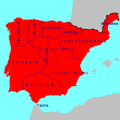








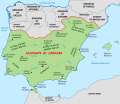
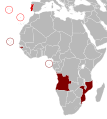

![Image 13Maios celebration in Madeira island [1] (from Culture of Portugal)](https://upload.wikimedia.org/wikipedia/commons/thumb/e/e1/2011-03-05_03-13_Madeira_045_Santana_%285543431418%29.jpg/120px-2011-03-05_03-13_Madeira_045_Santana_%285543431418%29.jpg)



